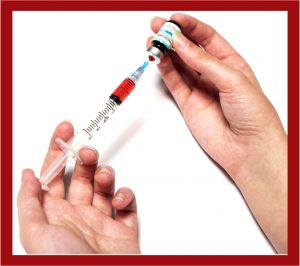The measles outbreak meets the anti-vaccination movement
Measles,a respiratory disease caused by a virus that is highly contagious, has made its way into the Houston area. The Centers for Disease Control and Prevention (CDC), confirmed 101 cases of measles in the United States as of Feb. 7, 2019. Five confirmed cases are here in the Houston area. Of the five confirmed cases reported, four of them are children under 2 years of age.

In the 1960s, before vaccines were developed, there were 3 to 4 million cases of measles in the United States each year. The rate of people vaccinated against measles became stable as a result of 1994’s Vaccines for Children program, and in the year 2000, the CDC declared the disease eradicated in the U.S.
However, the disease has experienced a resurgence in the past ten years. The national rate of vaccinations began to drop in 2008, mostly for fear of adverse reactions to vaccines. Most notoriously, now discredited British doctor Andrew Wakefield’s article blamed the MMR vaccine for causing autism in children. While the article has since been retracted, in 2010, it has caused a lasting influence on a growing community.
There are a variety of reasons people cite to opt out of receiving a vaccine including: religious reasons, risks associated with a specific health condition, and “herd immunization,” which is the concept that when enough people are vaccinated against a certain disease, the germs do not travel as easily from person to person so the entire community is less likely to get the disease.
As a result, people who cannot and/or do not get vaccinated, will have some protection from getting sick. For herd immunization to work, 90-95 percent of the population needs to be vaccinated. The National Immunization Survey indicated in 2017 that 91.5 percent of the United States population had the MMR vaccine and that 90.3 percent of people were vaccinated in Texas.
With the increasing rate of confirmed measles diagnosis across the nation, there is now a concern for the possibility of a measles epidemic.
Between 2017-2018, 56,738 students in Texas received vaccinations. Thequestion now is whether schools will make vaccines a requirement like California did in 2014 after an outbreak at Disneyland.
Currently, Texas public schools like Barbers Hill ISD, have a vaccine schedule that require Diphtheria/Tetanus/Pertussis (DTap); Polio, Measles, Mumps, and Rubella (MMR); Hepatitis B; Varicella; Meningococcal; and Hepatitis A to enroll. However, parents are allowed to file for an exemption.
Regarding those students who may be exempted, Barbers Hill ISD’s vaccine schedule states:
“Texas law allows (a) physicians to write medical exemption statements that the vaccine(s) required would be medically harmful or injurious to the health and well-being of the child or household member, and (b) parents/guardians to choose an exemption from immunization requirements for reasons of conscience, including a religious belief.”
Representing a segment of the community that does not opt for vaccines due to religious reasons, The First Church of Christ, a Christian Scientist organization, prefers a faith-based approach to healing.
“There have been many healings of children of chicken pox and other conditions where the symptoms and the pain haven’t run the medically predicted course, and the children have been healed and free sooner than normally expected,” states the Christian Science Committee on Publication. “Some of us have also had experiences where painful conditions considered medically ‘treatable’ haven’t been helped by medical care. These situations aren’t always clear in real life. It certainly isn’t intended to enable or justify ignoring a child’s condition or needs.”
While vaccines are valued by a majority of the population, there is a school of thought that challenges “big pharma” and opts for a natural approach to protection from diseases.
Dr. Robert A. Rakowski, DC, CCN, DACBN, DIBAK, with the Natural Medicine Center advises there are alternatives to traditional vaccines and points out adverse side effects do occur.
“Whether or not any parent consents to any medical procedure should be based upon full and informed knowledge of the risks and benefits,” Rakowski said. “My opinion is that after full research on both sides of the debate [vaccines], is that for my family, the risks exceed the benefits. I just had a patient who was diagnosed with rheumatoid arthritis ask me if the Hepatitis B vaccine could have been a factor. All of her symptoms occurred after ‘she was talked into the vaccination.”
The World Health Organization (WHO) names vaccine hesitancy as a top threat to global health and states that the world has seen a 30 percent increase in measles globally resulting in 110,000 deaths for 2017, most of them children under the age of five. WHO also reports that the estimated rate of severe reactions to the measles vaccine is one in one million doses, estimating 21.1 millions deaths prevented because of vaccinations between 2000-2017.
“Measles is not disappearing from Texas any time soon,” said Dr. Peter Hotez, MD, PhD, director of the Center for Vaccine Development at Baylor College of Medicine, in a newsletter published by Texas Medical Center. “As recently as the 1990s, measles was the single leading killer of children in the world, and we’ve allowed it to come back because we’ve allowed an anti-vaccine movement to go unopposed.”

